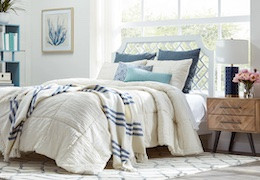Keeping a home spotless can be challenging, especially with busy schedules, pets, and hard-to-reach corners. The T8S...
Blog categories
Blog Search
Blog tags
Best Hypoallergenic Bedding for Allergy Sufferers
Bedding attracts certain allergens like dust mites, dander, and mold. Battling allergies is tough, but hypoallergenic bedding can help. You can get a hypoallergenic bed-in-a-bag to cover all your bases, or consider hypoallergenic fills and fibers for certain bedroom accessories. Keep reading to discover the right hypoallergenic bedding that will have you sleeping without sneezing all year round.
Natural Fiber Sheets

Sheets made with synthetic fibers can irritate sensitive skin because of the chemicals and processes used to make them. The answer? Sheets made with all-natural fibers. Bedding made from organic bamboo, cotton, wool, or silk is not only super soft and environmentally friendly –it’s also naturally hypoallergenic. Look for organic bed sheets with a high thread count. When bed sheets are woven more tightly, it makes it difficult for small irritants to pass through.
Memory Foam Mattresses, Pads, and Toppers

Allergens often fall through the empty spaces within coil and spring beds or settle into the dense fibers of pillow top mattresses. Reproduction ensues. Both mattress flipping and restless sleeping can release these allergens out of your bedding. Skip the spring mattress and go for a hypoallergenic latex or memory foam mattress. They make up the Best Hypoallergenic Mattresses for Allergy Sufferers.
Down Alternative Pillows, Comforters, and Duvets

Dust mites and dander flourish in the tiny spaces and gaps in down bedding. If your heart is set on the ultra-fluffy feel of down feathers, use hypoallergenic alternatives like polyester. Washable bedding materials such as microfiber and nylon are soft and non-porous, so they don’t allow allergens to sink into your pillows and bedspreads. It also helps to use neutralizing detergents that keep bedding irritant-free.
Hypoallergenic Bedding Covers

Each type of allergen is attracted to certain places and should be addressed differently. Dust mites gravitate toward pillows and comforters, mold thrives in the dark and damp places of your bed, and dander will settle almost anywhere. To thwart any allergen from getting into your bedding, encase your pillows, mattress, and comforter with hypoallergenic covers. Zippering your bedding inside a protective barrier will keep allergens at bay and prevent them from spreading.







Leave a comment